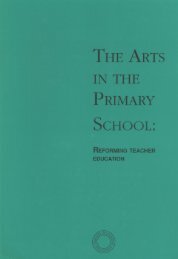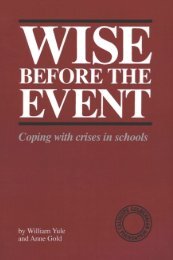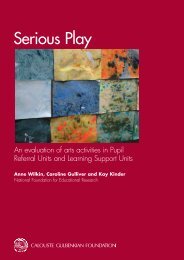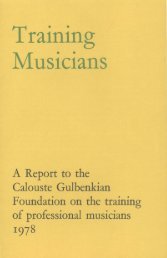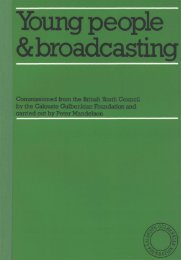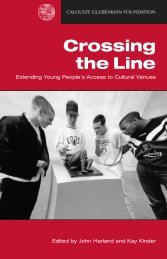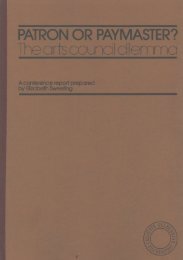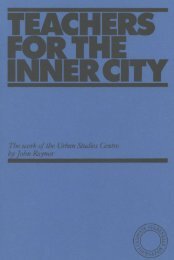The Arts in Schools - Calouste Gulbenkian Foundation
The Arts in Schools - Calouste Gulbenkian Foundation
The Arts in Schools - Calouste Gulbenkian Foundation
- No tags were found...
You also want an ePaper? Increase the reach of your titles
YUMPU automatically turns print PDFs into web optimized ePapers that Google loves.
achievement. 1 If all candidates were to be given 'A' therewould be compla<strong>in</strong>ts about fall<strong>in</strong>g standards or 'fix<strong>in</strong>g'. Forthe system to have any credibility there has to be a proportionof failures. A pupil's plac<strong>in</strong>g <strong>in</strong> the list does not depend solelyon personal performance. He or she may improve performanceby 100% over a year, but if everyone else improves similarly,personal grades will be no higher than before. To obta<strong>in</strong> abetter grade a student must take it from students higher upthe list by out-perform<strong>in</strong>g one or more of them. Moreover,children are entered <strong>in</strong> groups for exam<strong>in</strong>ations at the end ofa course of study which they will have started at the sametime: the start<strong>in</strong>g and f<strong>in</strong>ish<strong>in</strong>g po<strong>in</strong>t is based, for the mostpart, on how old they are. All that we know about childrentells us that they develop and mature, <strong>in</strong> every respect, atdifferent rates. Two pupils do not always reach the samestate of read<strong>in</strong>ess for exam<strong>in</strong>ations at the same time even iftheir latent potential for success is the same. <strong>The</strong>re areobvious shortcom<strong>in</strong>gs <strong>in</strong> tak<strong>in</strong>g children at these arbitrarypo<strong>in</strong>ts <strong>in</strong> their personal development, and compar<strong>in</strong>g themwith other children who may be at quite different po<strong>in</strong>ts, todecide, often once and for all, whether they have passed orfailed. Naturally some children do well and these may bequoted <strong>in</strong> defence of the system. But how do we take stockof the vast waste of potential among those who have beenprematurely written-off?141 <strong>The</strong>element offailure142 Argumentsforexam<strong>in</strong><strong>in</strong>gthe artsIt is not the explicit function of public exam<strong>in</strong>ations to failchildren, but an element of failure is <strong>in</strong>escapable <strong>in</strong> thedistribution of relative grades. In order to 'ma<strong>in</strong>ta<strong>in</strong> standards'it is essential to limit the number of passes and ensure apercentage of failure. <strong>The</strong> experience of failure is a constantpresence <strong>in</strong> such exam<strong>in</strong>ations and for those children who are'failed' it can have a deep effect on self-esteem and motivation:more especially where the experience is repeated.<strong>The</strong>y may, of course, be driven to work harder. <strong>The</strong>y maybe led to disparage the whole affair and become antipatheticor hostile to learn<strong>in</strong>g. <strong>The</strong> experience of failure can havesignificant consequences by negat<strong>in</strong>g the positive purposes forwhich schools exist.Despite these difficulties, there are three ma<strong>in</strong> groups ofargument currently advanced for <strong>in</strong>troduc<strong>in</strong>g arts exam<strong>in</strong>ations<strong>in</strong> schools.a Vocational<strong>Schools</strong> should be prepar<strong>in</strong>g children for life <strong>in</strong> the adultworld and should give them skills and the evidence thatthey have them. Exam<strong>in</strong>ations provide vocationalsupport.87



